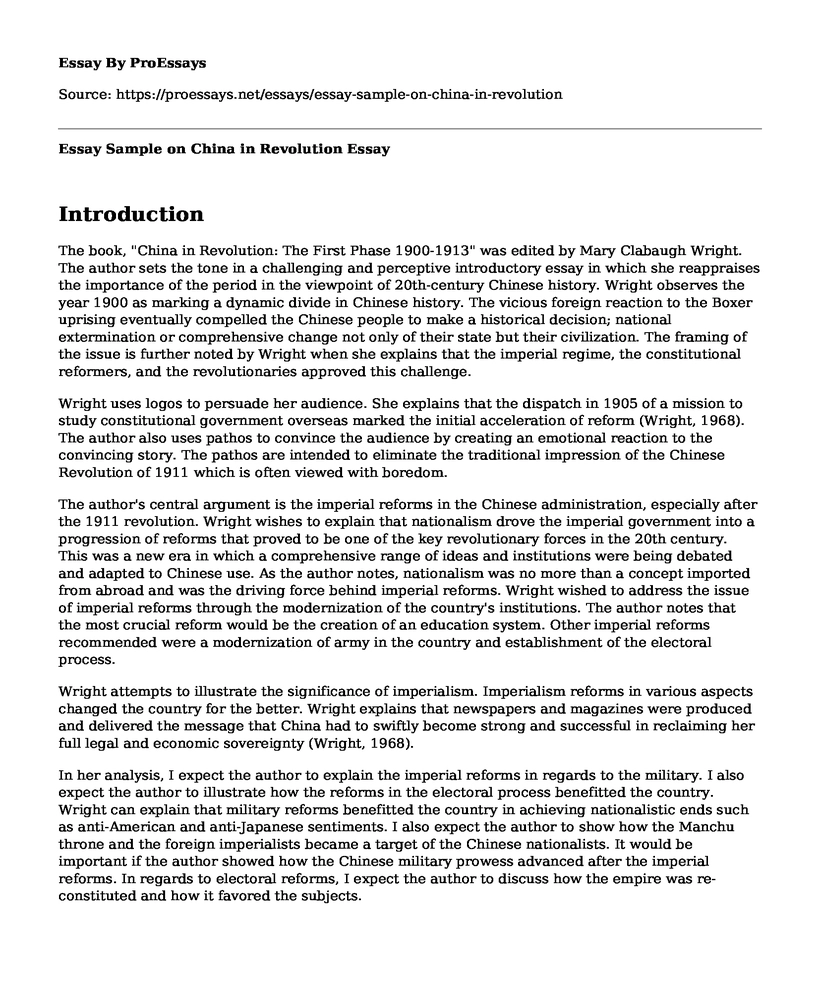Introduction
The book, "China in Revolution: The First Phase 1900-1913" was edited by Mary Clabaugh Wright. The author sets the tone in a challenging and perceptive introductory essay in which she reappraises the importance of the period in the viewpoint of 20th-century Chinese history. Wright observes the year 1900 as marking a dynamic divide in Chinese history. The vicious foreign reaction to the Boxer uprising eventually compelled the Chinese people to make a historical decision; national extermination or comprehensive change not only of their state but their civilization. The framing of the issue is further noted by Wright when she explains that the imperial regime, the constitutional reformers, and the revolutionaries approved this challenge.
Wright uses logos to persuade her audience. She explains that the dispatch in 1905 of a mission to study constitutional government overseas marked the initial acceleration of reform (Wright, 1968). The author also uses pathos to convince the audience by creating an emotional reaction to the convincing story. The pathos are intended to eliminate the traditional impression of the Chinese Revolution of 1911 which is often viewed with boredom.
The author's central argument is the imperial reforms in the Chinese administration, especially after the 1911 revolution. Wright wishes to explain that nationalism drove the imperial government into a progression of reforms that proved to be one of the key revolutionary forces in the 20th century. This was a new era in which a comprehensive range of ideas and institutions were being debated and adapted to Chinese use. As the author notes, nationalism was no more than a concept imported from abroad and was the driving force behind imperial reforms. Wright wished to address the issue of imperial reforms through the modernization of the country's institutions. The author notes that the most crucial reform would be the creation of an education system. Other imperial reforms recommended were a modernization of army in the country and establishment of the electoral process.
Wright attempts to illustrate the significance of imperialism. Imperialism reforms in various aspects changed the country for the better. Wright explains that newspapers and magazines were produced and delivered the message that China had to swiftly become strong and successful in reclaiming her full legal and economic sovereignty (Wright, 1968).
In her analysis, I expect the author to explain the imperial reforms in regards to the military. I also expect the author to illustrate how the reforms in the electoral process benefitted the country. Wright can explain that military reforms benefitted the country in achieving nationalistic ends such as anti-American and anti-Japanese sentiments. I also expect the author to show how the Manchu throne and the foreign imperialists became a target of the Chinese nationalists. It would be important if the author showed how the Chinese military prowess advanced after the imperial reforms. In regards to electoral reforms, I expect the author to discuss how the empire was re-constituted and how it favored the subjects.
Conclusion
The author builds credibility in her argument by presenting facts and evidence to the imperial reforms. Wright (1968) notes that "behind the mounting of the Tibetan expedition and the firmness on all frontiers stood new programs of recruitment, training, supply, and indoctrination." In regards to the electoral process, Wright (1968) explains that "the electoral assemblies provided national forums for share debate, the substantive issues which were potentially revolutionary." This shows that imperial reforms were revolutionary.
References
Wright, M. C. (1968). China in revolution: The first phase, 1900-1913. New Haven: Yale University Press.
Cite this page
Essay Sample on China in Revolution. (2022, Nov 21). Retrieved from https://proessays.net/essays/essay-sample-on-china-in-revolution
If you are the original author of this essay and no longer wish to have it published on the ProEssays website, please click below to request its removal:
- The Iliad and the Archaic Greeks - Essay Sample
- Compare and Contrast Essay on Malcolm X and Martin Luther King Jr.
- Political Personalities: Mahatma Gandhi Essay Example
- The New Economy of Late Nineteenth Century Essay Example
- Impact of the Great Depression on United States Culture - Essay Sample
- Essay Example on Southern & Northern Renaissance Art: Secular & Religious Differences
- Paper Example on 1492: Europe Discovers the New World







